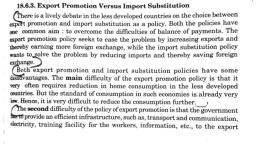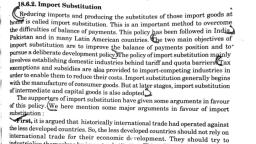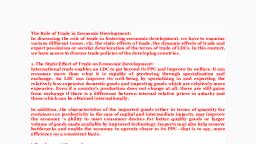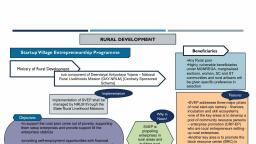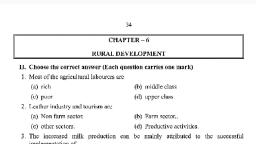Page 1 :
Rural entrepreneurship definition, concepts, benefits and importance, Rural entrepreneurship refers to initiatives and activities of the, entrepreneurs related to the establishment of industrial and, business units in the rural areas. Rural entrepreneurship can be, the panacea for the problems to poverty, migration, economic, disparity, unemployment and underdevelopment associated, with rural areas and backward regions., Rural entrepreneur can be considered as an important catalyst, in bringing about the economic development of a country and, of rural areas within the country. Rural entrepreneurs are that, class of entrepreneurs who carry out entrepreneurial activities, by establishing Industrial and business units in the rural sector, of the economy., ADVERTISEMENTS:, , Rural entrepreneurship concentrates on finding and, stimulating rural entrepreneurial talents and thereby promotes, the growth of indigenous enterprises., Rural entrepreneurship augments the economic value of the, rural areas by introducing new methods of production, new, markets, and new products. Moreover, it also generates, employment opportunities in the rural areas and thus ensures, rural development., In India as per the Census of 2011, out of the 121.2 million, population in India, the size of the rural population is 833.1, million which is about 68.84 percent of the total population., The economic development of India largely depends on the, progress of rural areas and the improvement of the standard of, living of rural masses. Rural entrepreneurship can significantly, contribute to national economy by enhancing the pace of rural, development., It recognizes opportunity in the rural areas and accelerates a, unique blend of resources either inside or outside of, agriculture.
Page 2 :
According to Government of India, “Any industry located in, rural areas, village or town with a population of 20,000 and., below and an investment of 3 crores in plant and machinery is, classified as a village industry”., All village industries have been classified into the, following seven categories:, ADVERTISEMENTS:, , (i) Mineral-based industries, (ii) Forest-based industries, (iii) Agro-based industries, (iv) Engineering and non-conventional industries, ADVERTISEMENTS:, , (v) Textile industry (including Khadi), and, (vi) Service industry., Benefits of Rural Industrialisation:, 1. Rural industries provide additional employment, opportunities, raise production and improve economic, conditions in rural areas., 2. Rural industries are labour-intensive. They provide, additional employment to men and women. Ensure, decentralisation of economic power and elimination of, monopolistic exploitation., 3. Decentralised production through network of well-knit rural, industries obviates the necessity of complicated managerial and, competitive marketing techniques, thus reducing the costs on, account of overheads., 4. Rural industrialisation leads to the development of rural, areas thereby lessening the disproportionate growth in large, cities, reducing the growth of slums, social tensions,, exploitation and atmospheric pollution., 5. Rural industries will strive to build up village republics and, human resources development., 6. Rural industrialisation provides ample scope for the, promotion of artistic achievement and creativity that has been, suppressed in rural areas.
Page 3 :
Although, agriculture is the main stay of the rural economy,, rural industry is a complementary industry. The pressure of, population on land is already high and increasing. In the, process, it has resulted in a large surplus of labour, both, educated as well as uneducated in rural areas. Agriculture alone, cannot absorb the entire surplus force and hence the need for, rural industries. If we consider rural industry as a main stay,, agriculture is an important part of this process., Rural industrialisation aims at the maximum productive, employment of local resources, revival and development of, traditional industries and skills, establishment of new units and, integration of agricultural and industrial development to local, prosperity, progressively narrow down the disparities between, urban and rural incomes, prevent migration of rural, population. More so, rural industrialisation has been assigned a, crucial role in the development of industrially backward areas, in rural India., Importance of Rural Industrialisation:, Rural industrialisation is important not only as a means of, generating employment opportunities in the rural areas with, low capital cost and raising the real income of the people, but, because it contributes to the development of agriculture and, urban industries. Without rural industrialisation, it would be, considerably more difficult to solve the problem of agricultural, unemployment and widespread underemployment. Rural, industrialisation promotes rural industry., The development of rural industries increases the level of, income in rural areas, and tends to break down the old selfsufficiency of the family and lessen its cohesiveness, creating, opportunities for youth, women and the able bodied as well in, changing the pattern of leisure and work., Rural industrialisation should be looked upon not merely as, way of containing the rural workers and stopping them from, migrating to urban areas by providing them some kind of, remunerative employment in the villages, but as a dynamic, element in process of raising the productivity and income levels, of the workers in areas.
Page 4 :
The main characteristics of these industries are to develop local, initiative cooperation and spirit of self-reliance in the economy, and at the same time, help in utilisation of the available, manpower for processing locally available raw materials by, adopting simple techniques., These are capable of offering employment opportunities at the, place of residence to a large section of population., The village industries are an antidote to the widespread, problems of disguised unemployment or underemployment., These decentralised industries require less gestation period on, the one hand and produce goods of common necessities on the, other., These industries have the capacity to correct regional, imbalances by initiating industrial activities on dispersed basis, in the most neglected, backward inaccessible areas where, perhaps large-seals sector is unable to penetrate., Being small, these activities can ensure maximum participation, of workers in management thus ensuring a feeling of, involvement which is so uncommon with the large-scale sector., These industries possess an additional advantage wherein the, maximum participation of womenfolk can he ensured., Rural industrialisation has taken roots in the rural economy in, India. This is so because simple forms of manufacture typical of, consumer goods industries and varied service industries, are, everywhere developed before the more complex process, involved in the production of capital goods, and because the, size of the home market at the time of industrialisation, prohibits the establishment of optimum- sized plants in the, production of certain capital goods.

